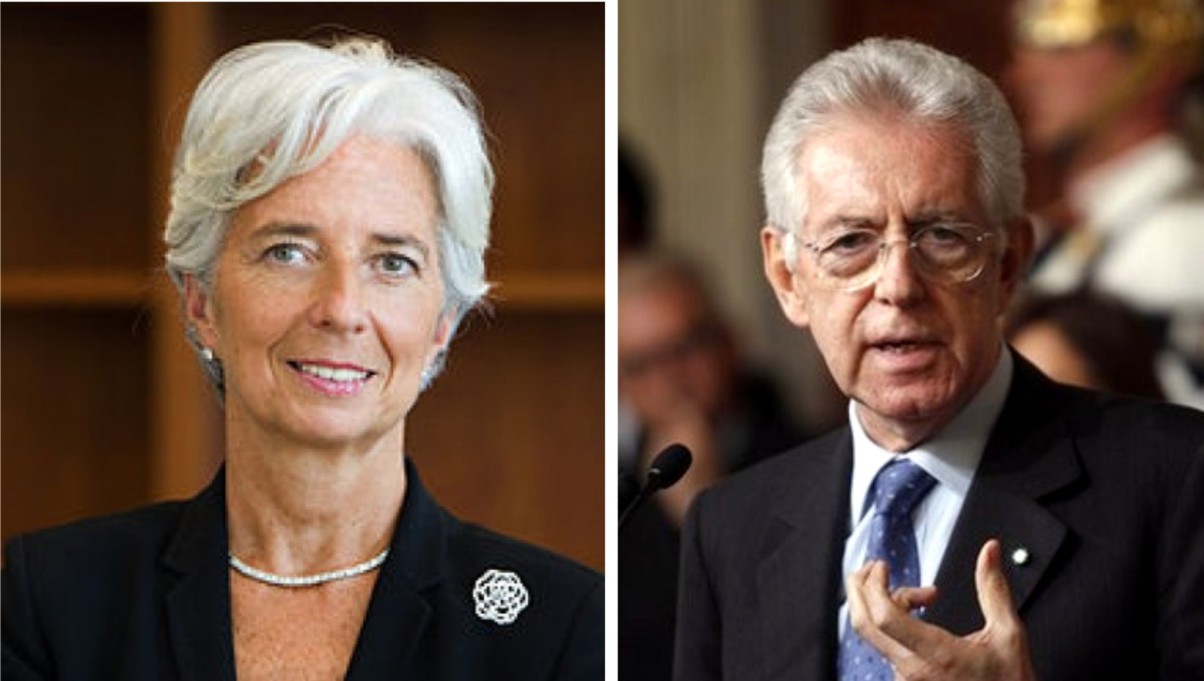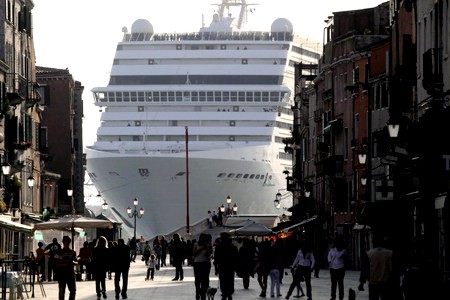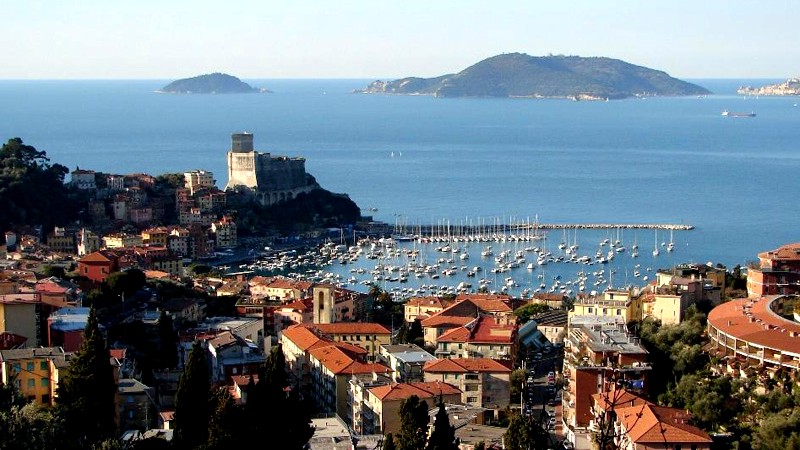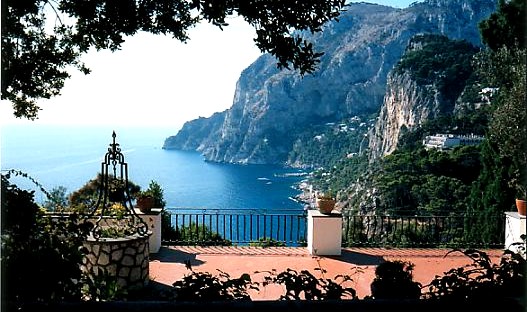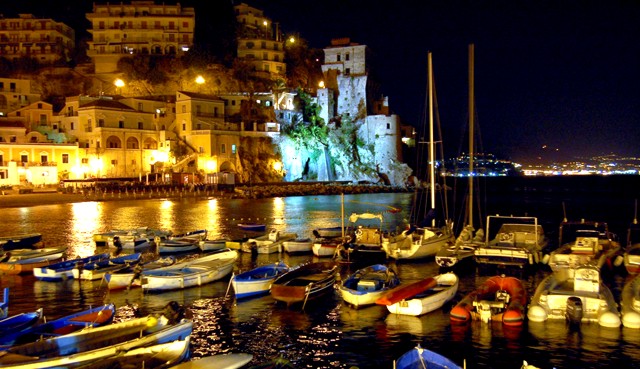
Thursday, Knox lawyers will argue to First ("Murders") Chamber of Supreme Court that Florence court's Calunnia II conviction of Knox was wrong. Uphill battle. Florence reasoning has been widely praised.
Saturday, March 10, 2012
International Monetary Fund Head Makes Encouraging Remarks About Italian Economy Turning Around
Posted by Peter Quennell
Nervous Italians with resources have in recent months been moving major sums to the UK and investing in the property market in London.
A recent survey published by agency Knight Frank shows that Italians have overtaken Russians as the leading buyers of prime London property. Since January, they have accounted for eight per cent of all sales in the area. Last year it was the Greeks, who more than doubled their spending on prime London as riots raged across Athens. This year, it is their cousins across the Adriatic who are opening their chequebooks. The total spend for Italians in prime London is estimated to be £408m for 2011, up from £185m in 2010…
Economic reports worsen daily. The Bank of Italy forecast the Italian economy to contract by 1.5 per cent this year, while employment is shrinking at its fastest rate since July 2009. The eurozone as a whole continues to be locked in crisis. Successive rescue packages have failed to improve things, and German lawmakers are reported to be preparing for Greece’s departure from the euro. Where Greece leads, there is a risk Spain, Portugal and Italy will follow…
Italians with the resources to do so have been taking their money out of the country as fast as they can. And where better to head than London? The capital’s history, shopping, culture and nightlife, as well as Britain’s reliable legal system, make it the clear target for a safe property investment.
Still, £408m is a drop in the bucket compared to the $2 trillion Italian economy. And that take on the economy is somewhat behind the curve. Bloomberg business news reports that Italian government bond sales are now going really well.
Italian 10-year bonds rose for a ninth week, the longest run of gains since 1998, as the European Central Bank signaled the economy is stabilizing and Greece won the world’s biggest sovereign-debt restructuring.
And of Prime Minister Mario Monti, Christine Lagarde of the IMF just had this to say.
At a dinner for delegates to the Women in the World Summit in New York City on Thursday night, International Monetary Fund Managing Director Christine Lagarde singled out one man as a beacon of hope in the bleak global economy.
Since the technocrat Mario Monti replaced the infamously irresponsible Italian Prime Minister Silvio Berlusconi in November, Italy is no longer the most disastrous problem facing the European economy, she said.
The trust of investors is being restored and “it could well be that Italy is going to be the light of the European tunnel,” said Lagarde. “I would not short Italy, at all.”
Nobody responded yet to European leaders’ recent loud lament that austerity programs will not turn Europe around and a stronger sense of how growth works is required.
Next week we’ll give it a shot!
Friday, March 09, 2012
Cruise Ships Told To Keep Well Away From Picturesque But Fragile Coastal Points
Posted by Peter Quennell
New maritime instruction from the Italian government
Included are Venice, the Amalfi coast, Capri and some other islands, and the Italian Riviera, all below
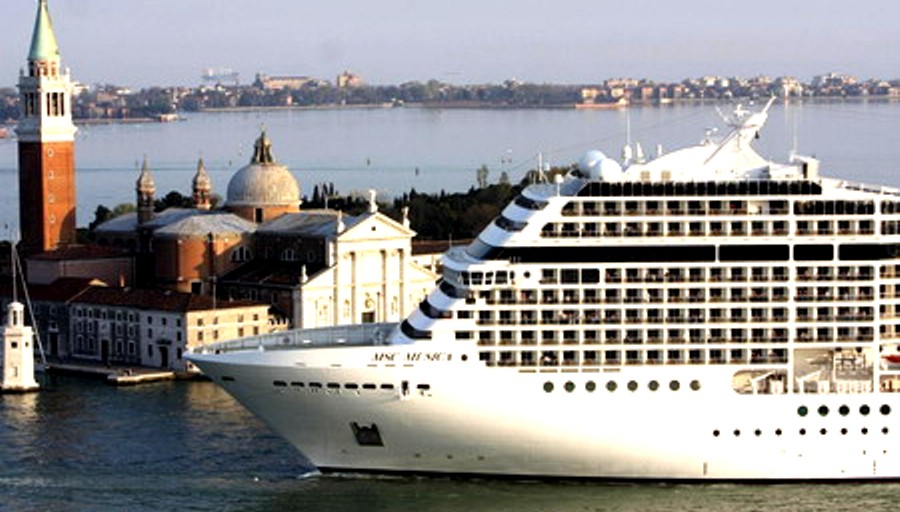
Thursday, February 23, 2012
Sollecito Ghost Writer Andrew Gumbel Reveals To MedaBistro How Ill-Informed He Is About His Client
Posted by Peter Quennell

[Above left: Sollecito ghost writer Andrew Gumbel; above right, Sollecito agent Sharlene Martin]
Right now Sollecito ghost writer Andrew Gumbel is making loud, silly claims like many other writers who came upon the case and first fired from the hip.
And then “mysteriously” went silent and have not been heard from again. We have helped to edge back from the brink several dozen such reporters. Perhaps they ought to thank us - oh, actually in several instances they did.
Here on Media Bistro Andrew Gumbel gives a shoot-from-the-hip interview in which he seems to display a terrible batting average on the hard truths. The interview is being smartly ridiculed in the comments below it by among others TJMK’s own well-informed pro-Meredith campaigner Bucket Of Tea.
Here, to help set Mr Gumbel straight before it is too late, is our own informed commentary on what he said.
A: It’s a rule of thumb that prosecutors dictate media coverage in a criminal trial. They are the ones who bring the charges, and are either vindicated or successfully challenged in court; the texture and the substance of the defendants’ stories tend to get lost. And so it was here. The media coverage focused largely on the yes/no question of whether Amanda Knox and Raffaele Sollecito were guilty.
Untrue.
The mechanics of the case from the inside “” how they were interrogated, why they were prosecuted even after the most obvious perpetrator, Rudy Guede, was caught and convicted, the behind-the-scenes haggling between lawyers, defendants, expert witnesses, court officials and others “” have been revealed only in glimpses, if at all.
Untrue.
Both Amanda’s book and Raffaele’s book are sure to shed light on how and why this grotesque miscarriage of justice arose. I would venture to say Raffaele’s story is even more absorbing than Amanda’s, because it was his family which orchestrated the detective work that made it possible to dismantle the case against both of them piece by piece. It was a high-wire act from beginning to end, and it’s a thrilling tale.
Untrue.
Amanda and Raffaele can’t bring Meredith back, but they can give everyone the benefit of the truth. It’s an important story to tell. And after all they have gone through “” including the huge hit their families took to their reputations and their pocket books “” they certainly deserve both vindication and compensation….
Untrue.
Not only will the book leave no doubt about Raffaele’s innocence; everything Raffaele and his family have to tell, backed by previously unpublished documents in the case, suggests that his incarceration had almost nothing to do with the actual evidence but had another motivation entirely “” to be revealed when the book comes out…..
And untrue.Absurdly so.
Thirty plus judges who reviewed the case had no “other motivation entirely”. Please drop the smears of Italy and Italian justice. It isn’t becoming and there are already enough calunnia suits for felony defamation in the works.
And Sollecito’s family orchestrated no amazing detective work that showed that all the evidence was at fault. The defenses had every opportunity to do so in 2009 at trial and they did a truly terrible job. The Supreme Court already knows this so in what way exactly have they won?
In fact the main thing the Sollecito family is famous for right now is that they all face a trial in Bari. The charges are (1) illegally releasing video evidence to a TV network and (2) illegally attempting to subvert the police and prosecution by political means.
Now that’s true. Its seems two serious laws may have been broken. Andrew, read up about your Dear Clients here and especially here. They haven’t even attempted to “explain” all that as yet, and are almost certainly going to go down at trial.
And by the way, the evidence that the Sollecito family leaked to Italian TV? Video images of the naked body of Meredith. Very nice clients? You’ve been conned.
Monday, February 20, 2012
HarperCollins: Perhaps This Explains Why Jonathan Burnham Was Inspired To Take Such A Seeming Risk
Posted by Peter Quennell
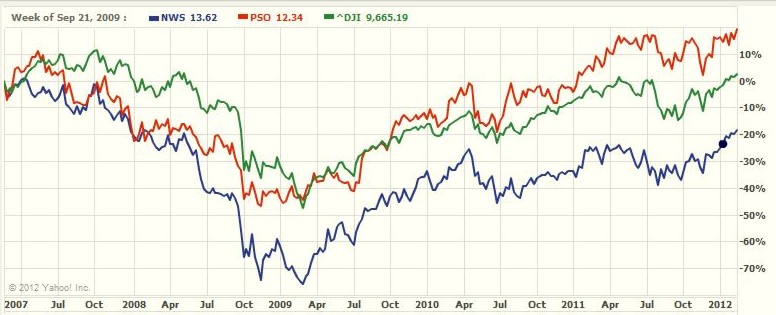
HarperCollin’s parent company News Corp itself continues to be a major news items, especially in the UK.
Rupert Murdoch’s News Corp vehicles have had a history of racy reporting and and right-wing-party support, and now both are rather on the outer. The investigations in London into phone tapping and bribing of police for stories seem only to be getting worse.
As a result NYC-based News Corp and its minions, perhaps including HarperCollins (Jonathan Burnham is one of Rupert’s talented British imports to New York) might be making some risky or unwise moves.
Okay. Back to the stock charts once again to see what the collective voting wisdom of informed investors may be telling us about this.
News Corp cannot be compared directly to Lagadere the parent company of Hachette which is soon to publish John Kercher’s “Meredith” as the Paris-based Lagadere is not listed on the New York exchange,
So here above we show the stock for Penguin Publishing’s parent company Pearson instead. It is a good surrogate as Lagadere and Pearson are the world’s two most successful and fastest-growing publishing groups.
What does the chart above tell us? (Click it for a larger version.) The green curve is the Dow Jones index, which is the stock exchange’s large-company average.
- Over the five years shown Penguin’s parent Pearson (red curve) is UP around 20% compared to the average.
- Meanwhile HarperCollins’s parent News Corp (blue curve) is DOWN an amazing 30 percent compared to the average.
That 30 percent down represents a drop of over FIFTEEN BILLION DOLLARS in five years in the market value of the parent company. Very worrisome for the hard-pressed Mr Murdoch and the increasingly edgy News Corp stock holders.
And who knows? Maybe it helped inspired Mr Burnham in his office a few blocks away (he surely owns the News Corps stock and wants the whole company to gain) to go for broke on the Knox book with $4 million down.
Did any of the main media reporting on the book (over 200 hits on Google News) happen to mention this?!
Sunday, February 19, 2012
HarperCollins: A Commendably Balanced Report By The UK Daily Telegraph’s Iain Hollingshead
Posted by Peter Quennell
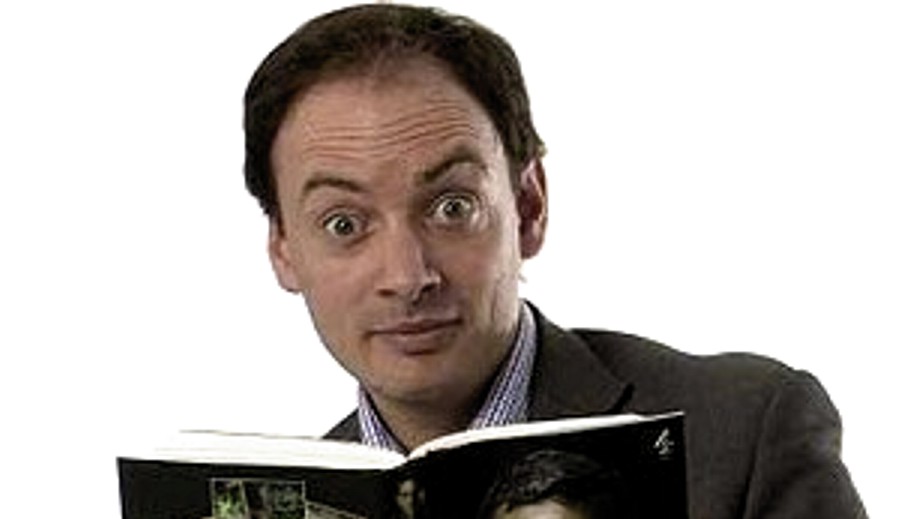
Iain Hollingshead has written a fair and balanced piece in the Daily Telegraph. It contains quite a few notes of caution for HarperCollins:
1) Iain Hollingshead has this restrained Anne Bremner comment from her side though it fails to mention the million-dollar-plus PR campaign that has so many people addled on the real evidence; a pity Iain Hollingshead didnt press her.
“No one here has lost sight of the enormity of the fact that Meredith was killed,” says Anne Bremner, a Seattle-based lawyer and a spokeswoman for the Friends of Amanda Support Group. “But there’s widespread belief in Amanda’s innocence. And when something horrible happens, people all over the world are interested in how you get through it.”
Something horrible happened to Meredith too, of course - and she didn’t get through it. Anne Bremner might press Amanda Knox to make sure to answer in her book the several hundred open questions.
2) Then Iain Hollingshead quotes a London agent who is saying, like other agents and publishers, that HarperCollins sure seems to have taken on a risky publishing venture:
A positive balance sheet is far from guaranteed, however. “I think it’s very risky money,” says Ed Victor, the London-based literary agent whose clients range from Keith Richards to Alastair Campbell and Frederick Forsyth. “But all advances at that level are risky. A lot will depend on whom they hire as the collaborator. It has to be written well.”
3) Also Iain Hollingshead points out what many others have previously pointed out which is that that Knox is not really known for good prose or interesting writing:
HarperCollins hasn’t released the name of the ghostwriter, but one imagines they will have their work cut out. Not only is the book scheduled for publication early next year, they will also have to tread the fine line of polishing Knox’s prose without losing her voice. Although Knox is said to have harboured long-standing dreams of becoming a writer, extracts from her prison diaries ““ some of which were given to investigators in an attempt to clear her name and were later leaked to newspapers ““ suggest that she has a little way to go. One poem read: “Do you know me? Open your eyes and see that when it is said I am an angel, or I am a devil, or I am a lost girl, recognise that what is really lost is: the truth!”
By the way, Mr Burnham of HarperCollinws is widely quoted as saying that Amanda Knox’s side of it is the only one still to come out. He seems to think that her side of it is still a mystery, and that the world is holding its breath.
Really?!
She seems to be one of the most widest quoted perps or suspected perps or non-perps in all history. In fact, she talked so much in the early days that her own lawyers had to publicly caution her to stop piling wrong explanations on wrong explanations.
There are her letters and her emails and her diaries and her notes to police and prosecutors. Plus long quotes from her in books by for example Rocco Girlanda. Plus her two full days on the witness stand. Plus half a dozen major statements to the trial court and appeal court. Plus a few hundred quotes from her family on her behalf. Plus her whole raft of alibis.
Often (when her parents and lawyers are not shushing her) she seems to be digging herself in deeper. Which elements of her story does Mr Burnham think we are all waiting for?
4) Also (although Iain Hollingshead fails to mention John Kercher’s book due in April and may not know about it) he points out that Meredith is the real victim in this case and a very sympathetic one especially in the UK.:
In the British market, Knox’s book will face far greater challenges than the quality of her ghosted prose. “I don’t think the book will be huge here because a lot of British sympathies are with the British victim,” says Victor.
5) Also Iain Hollingshead points out that when there is a sympathetic real victim there is little evidence that the perp or framed perp (dont they all claim they are framed?!) sells a lot of books:
The interest in the O”‰J Simpson case, for example, did not lead to good sales for his book, If I Did It. And while many pundits are comparing Knox’s book to Jaycee Dugard’s A Stolen Life, the memoir of the Californian girl held against her will for 18 years which has sold more than a million copies since last July, Victor thinks the comparison unhelpful. “She was the victim of a crime, not the putative perpetrator of a crime,” he says. “And that’s a big difference. You could say she was the victim of a miscarriage of justice ““ but so are a lot of people.”
6) And Iain Hollingshead shows us that Andrew Gumbel, Sollecito’s ghost writer, is pretty uninformed on the case.
We will now be able to watch him having a tough time writing on the hard evidence and the fair Italian system and the real character of the druggie loner Sollecito. Assuming that Mr Gumbel hasn’t made up his mind:
“The book will be a lot of things: a love story, a harrowing description of an innocent young man in prison, a full-blooded Italian family drama, and a legal thriller,” says Gumbel. “But these are not the only reasons I got involved: what happened to Raffaele and Amanda was inexcusable and unconscionable and my intention is to get to the bottom of exactly why they were targeted.”
Gumbel denies he’s cashing in on a brutal murder. “I know that, in Raffaele’s case, no day has gone by without him thinking of Meredith and the hell her family has gone through,” he says. “We are not ‘cashing in’ on her death, but rather illuminating the way the Italian police and judiciary compounded the tragedy by throwing two young people into prison for no good reason. Their stories ““ both their stories ““ deserve to be heard and I believe it is important that they are.”
Cashing in on Meredith’s death? No, the thought never even occurred to us. Image of the accusatory and under-researched Mr Gumbel below. Keep on his tail Mr Hollingshead.
7) We would have liked Iain Hollingshead to touch on the risks of calunnia for HarperCollins, but to be fair to him it is doubtful he knows what in the very fair Italian system that defense for those unfairly attacked means.
Mr Burnham and Mr Gumbel seem to be setting themselves up nicely to find out.
[Below: Sollecito ghost writer Andrew Gumbel; and Sollecito book agent Sharlene Martin]

Friday, February 17, 2012
Were Prospective Knox Publishers Given The Full Score On The Likely Legal Future Of This Case?
Posted by Peter Quennell

[Above: the seemingly hornswoggled Jonathan Burnham and Claire Wachtell of the HarperCollins house]
One publisher who passed on the Amanda Knox book then came here to read and told us he was rather shocked.
All the publishers going in to the auction were apparently not briefed by the Knox huckster team about the legal minefield this case still continues to represent. It may not have mattered to HarperCollins of course. It was HarperCollins that published OJ Simpson’s notorious “If I Did It” and they seem to have come out ahead.
One of the quirky outcomes of the Simpson venture the Amanda Knox team might like to draw a lesson from is that the “If I Did It” book (written by a ghost writer for Simpson, and as one Amazon reviewer said “chock full of omissions”) directly fueled the public anger that helped to put Simpson behind bars for a long time.
Typical of the hyper-cautious Italian system, this case is passing through three automatic phases like a three-act play. The Knox team can beef now about harassment and double jeopardy, but they have filed their own Supreme Court appeal, and it is written into the Italian constitution that no verdicts and sentences that are appealed are final until the Supreme Court signs off.
Act One
Act One started early in 2009 three months after Guede’s trial and we all saw as reported here on TJMK a very speedy and precise presentation of the prosecutions’ case. This was followed by the spectacle of Amanda Knox doing herself considerable harm in her two days on the stand. Thereafter through autumn and well into winter 2009, a weak and faltering defense was presented, with several court days simply cancelled because the defense could think of nothing more to say.
Judge Massei’s jury then quickly came to a unanimous verdict and he wrote up the reasons for it in an excellent 425-page report. He differed in only one major respect from Judge Micheli who in October 2008 concluded that Amanda Knox had organized and led the pack against Meredith and that Rudy Guede was unwittingly or accidentally drawn in to her torture and murder. (He still handed Guede 30 years.)
Judge Massei didnt cover the Rudy Guede evidence in nearly the same depth as Judge Micheli (Guede was only briefly in the Massei courtroom, and because Mr Mignini would not do a deal he barely spoke). In rather a stretch, Judge Massei argued that Guede set the escalation in motion which resulted in Meredith’s death. Few of us believe that.
UK and US lawyers have told us that under US and UK rules it is very unlikely that any judge would have then allowed the case to go to appeal. Knox and Sollecito would have served out their time and possibly emerged much better off for it - you can see the ugliness flowing back into them now..
Act Two
Act Two in 2010-11 saw the playing field becoming increasingly tilted. Mr Mignini happened to catch on tape a Florence prosecutor lamenting that the Monster of Florence cabal for which Doug Preston is such an eager beaver was tying his hands. The Florence prosecutor then sought to get his own back by taking Mr Mignini to court.
All sorts of amateur second-guessers on the evidence now got into the act, and few outside Italy any more had a firm command of the actual hard facts. It is rumored that Judge Hellman may have had a bias even before he ever got involved with the case. Mention of Meredith was almost nowhere to be found, and there was a constant drumbeat for Sollecito and Knox kept alive by their families and the US media and the MP Rocco Girlanda.
Helping the defenses was that soon after Meredith’s death the defenses played one huge trick. They failed to show up when Dr Stefanoni did her DNA tests. That then allowed them to impugn and slur her and her work with no hard evidence to hand. This rose to a crescendo when Judge Hellman’s two under-qualified consultants reported at appeal.
Amanda Knox still ended up being handed three years in prison, but with time served Judge Hellman released the two “young people” which was a verdict that to very few informed Italians made sense.
Act Three
Act Three starts with legal terrain that looks very different. Dr Galati has set the stage for a very, very tough third act, and he is making quite sure this time that the playing field is not tilted by any further monkey tricks. No wonder the publisher mentioned up top is surprised though. .
- NOT ONE non-Italian media source has made it clear that the Umbria regional prosecution office has a very special and prestigious status in Italy as the prosecution office that takes on cases against officials and politicians in the Rome government, so that the Rome police and prosecutors avoid conflicts of interest..
- NOT ONE non-Italian media source has explained who Dr Giovanni Galati really is. He could rightly be described as the most experienced and respected and capable of all Italy’s 24 regional chief prosecutors. He was a Deputy Attorney General with the Surpreme Court in Rome before his assignment just over a year ago to Umbria, and unlike the main Knox and Sollecito lawyers he knows the internecine Supreme Court rules and ways of addressing Italian law like the back of his hand.
- NOT ONE non-Italian media source has explained what we have reported in the four posts just below: that Dr Galati is stating that Judge Hellman BROKE ITALIAN LAW in two make-or-break respects. Judge Hellman is seen to have extended the appeals court’s terms of reference in ways that he is forbidden to do. And he introduced the DNA consultants which (as Mr Mignini several times argued) he was also forbidden to do.
Amanda Knox and Raffaele Solecito now face the fights of their lives. The last thing they need in this shark tank is a couple of biased self serving books “chock full of omissions” and anti-Italy smears.
They will almost certainly have to get up on the stand under oath and cross-examination and try to explain their scenario in a context where they each have contradicted and even accused one another. Their lawyers may be okay at trial or first appeal level but they are very outclassed by Dr Galati at this third level and it would seem the Knoxes, Mellases and Sollecitos would be best served to find new (very expensive) Supreme Court teams
Italians on the whole are angry and humiliated at the ill-argued first-appeal outcome. Judge Hellman seemed to show biases that he really should not have. Dr Mignini is back to being in the clear in his case as it was ruled (rightly) that the Florence prosecutors did not have jurisdiction over him. The Supreme Court took a very firm position in December 2010 that Rudy Guede did not act alone. The defense star witnesses Alessi and Aviello that might help accomodate to this have imploded, and both may face trials of their own.
A pretty grim portrait of Amanda Knox both prior to Meredith’s murder and while Knox was in Capanne prison is not hard to find in Perugia from multiple sources. If a devastating “Real Amanda Knox” book is not inspired by the HarperCollins book, we will be surprised, and it could sell more than hers. And if the slightest defamation about anyone in Perugia appears in the AK book, then HarperCollins will have the great joy of finding out what “calunnia” means.
President Obama and Senator Cantwell both have tough elections on their hands and Hillary Clinton and the Rome Ambassador David Thorne (an Obama political appointee) will need to be in ultra-careful mode this time around. Amanda Knox and her parents and Sollecito’s parents all face separate trials coming up. Rabid books will not help any of them there.
And in April the likeable book “Meredith” by her father John will be published - by a global publisher (Hachette) five times HarperCollins’s size.
Wednesday, February 15, 2012
Weighing The Ten Points On Which The Perugia Chief Prosecutor’s Supreme Court Appeal Is Based
Posted by brmull
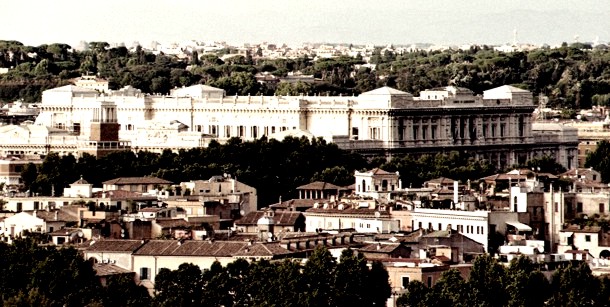
[Above: the Supreme Court of Italy seen from the south-east across the River Tiber]
The Chief Prosecutor and Deputy Chief Prosecutor of Umbria base their formidable appeal on ten points repeated here from ZiaK’s excellent translation below.
The reasons for the appeal to Cassation which Perugia’s General Prosecution presented today against the acquittal verdict of Amanda and Raffaele are based on ten points of the second-level verdict.
The first is the lack of grounds for the decision, in the decree of 18 December 2010, to allow the forensic testimony/expert witness in the appeal judgement.
The second, in contrast, concerns a contrary decision: the decision to not allow a new forensic investigation requested by the prosecution at the end of the ruling discussion. In the appeal to Cassation it is written that the Appeal Court’s rejection reveals “contradictoriness/contrariness and demonstrates manifest illogicality in the grounds for the judgement/reasoning report”.
The other points deal with the decision by the Appeal court of Assizes of Perugia to not hear the witness Aviello, also the definition of “unreliable” [in the Hellman Report] with reference to the witnesses Roberto Quintavalle and and Antonio Curatolo, also the time of death of Meredith Kercher, also on the genetic investigations.
As well as the analyses of the prints and other traces, also the presence of Amanda and Sollecito in via della Pergola, also the simulation of a crime [the staged break-in], and also the exclusion of the aggravating circumstance of the crime of “calumny”.
1. I agree that the appointing of the independent experts was unjustified, because they were essentially just another opinion, a sort of tie-breaker, applying 2011 standards to 2007 evidence, who were revealed to have pre-existing biases about the questions posed to them.
Independent experts should be a piece of evidence, not a final arbiter. I know the Kerchers opposed the appointment of these experts (I don’t know about the prosecution) so clearly they weren’t a consensus choice, as is preferred whenever independent experts are employed.
2. I agree that if Conti and Vecchiotti were allowed to judge the scientific police by 2011 standards, then the court should have allowed testing using highly sensitive 2011 technology. Furthermore Dr. Stefanoni was left to defend her work against the academic experts, without any back-up from Dr. Novelli who is more than a match for the independent experts in terms of credentials.
3. I’m on the fence as to whether the court should have recalled Aviello to discuss why he had recanted his testimony. I don’t know what the legal procedure is when a witness recants while the trial is still underway.
4. I strongly agree that the decision to recall the man in the park, Curatolo, and then determining that the old man’s memory was unreliable four years after the fact, was completely inappropriate. Curatolo’s testimony at the first trial was more than adequate. Nothing was learned from this exercise except that his memory has become worse with time (whose hasn’t?) and that he subsequently got in trouble with the law, which is overly prejudicial.
5. If the court insisted on recalling Curatolo to try to assess his reliability, they should have done the same for the store owner Quintavalle. Instead he was deemed unreliable based on a cherry-picked selection from his 2009 testimony.
6. On the time of death, I’m one of those who believe Hellmann got it right, but it has no bearing on the defendants’ guilt or innocence, since they have no alibi for either time. I look forward to the prosecution’s argument on this.
7. I agree that Hellmann’s decision to accept the defense explanation for the footprints was arbitrary and not justified by his motivations report.
8. The luminol traces in Filomena’s room were improperly determined to be footprints. They were then lumped in with the footprints in the hall without any separate attempt at explanation.
9. I agree that the Court’s determination that the defendents would not lie about being at the cottage, simply because they were “good kids” is outrageous. (In the U.S. you can’t use character evidence to decide innocence or guilt, and doing so would mean a mistrial. I’m not sure about the situation in Italy.)
10. I agree Hellmann’s explanation for the simulation of a crime was a sham, in which he accepted all of the defense arguments and showed no curiosity at all about whether this scenario could actually happen. The court had clearly made up its mind about the case already and decided to just shove the staged break-in, a crucial part of the case, under the rug.
***
*The prosecution also wants to add “aggravating factors” to the charge of calumny. This is a freebie. I don’t know if it will have any bearing on the appeal.
**The fact that Hellmann seems to have applied the “reasonable doubt” standard to individual pieces of evidence, when this should only apply to the case as a whole, seems like a huge basis for appeal. I’m glad to see the prosecution bringing this up.
Perugia’s Excellent Umbria24 Posts Details Of Dr Galati’s Extremely Tough Supreme Court Appeal
Posted by Peter Quennell

Italian lawyers are already remarking that Dr Galati’s appeal as summarised below is as tough as they ever get.
In their view the Hellman report reads more like a defense brief than a balanced appeal-court outcome in a murder trial. Both judges were put on the case on mysterious instructions from Rome, suggesting that the minister of justice had perhaps been leaned on - the judge pushed aside was extremely annoyed.
Both Judge Hellmann and Judge Zanetti, while undeniably good judges in their own fields (business and civil), are vastly less experienced at criminal trials than either Judge Micheli or Judge Massei. The entry in the Italian Wikipedia describes them thus.
Although the Assize Court of Appeal was to be chaired by Dr. Sergio Matteini Chiari, Chairman of the Criminal Division of the Court of Appeal in Perugia, in circumstances not well understood Dr. Claudio Pratillo Hellmann, who chairs the Labor Chamber of the Court, has been called on to preside over the appeal court,
The judge to the side of the main judge, Dr. Massimo Zanetti, came from the Civil Section, and both had had limited experience with criminal trials both rather remote in time (only the cases of Spoleto and Orvieto).
Judge Hellmann’s announcement of the verdict on the night was very odd, suggesting he had been outnumbered and was embarrassed. Remarks he made the next day seemed to confirm that. The weak sentencing report is said to be not his work, and was written by Judge Zanetti.
The Supreme Court of Cassation could insist on a complete new appeal trial or a partial new trial in Perugia if it accepts any of Dr Galati’s arguments at all. His appeal statement appeal is in three tiers, and a reversal could be ordered at any tier..
1. The Hellmann Court’s wide scope was illegally far too wide
Italian judicial code is very clear on this. They MUST stick to just the appealed items and not wander all over the map. Judge Zanetti was quite wrong at the start to declare that everything was open except the fact that Meredith had been murdered.
2. The DNA consultancy by Stefano Conti and Carla Vecchiotti was illegal
Defenses had every chance to attend the Scientific Police testing the first time around. It was a slippery dodge to skip those tests and then slime them. They had every opportunity at trial to throw aspersions. They are not meant to shop around.
3. There are many problems of wrong logic, evidence, and witnesses
The Massei trial sat through weeks and weeks of skilled prosecution presentations of the evidence including the forensic evidence and the many witnesses. The Hellman court got to see almost none of this and heard mostly from the defense.
This translation is from Umbria24 by our main poster ZiaK.
Meredith case: the prosecution appeals to Cassation: the acquittal verdict should be “nullified”.
For the Chief Magistrates of the [Umbria] Prosecution, “it was almost exclusively the defence arguments which were taken heed of”
By Francesca Marruco
The first-level conviction verdict was “complete and thorough” while the verdict of the second-level is “contradictory and illogical”. For this reason, the General Prosecution of Perugia asks the Cassation to revoke or invalidate it.
“We are still extremely convinced that Amanda and Raffaele are co-perpetrators of the murder of Meredith Kercher” said the Chief Prosecutor of Perugia, Giovanni Galati and the Deputy Chief Prosecutor, Giancarlo Costagliola.
Verdict that should be revoked
“The second-level verdict should be annulled/revoked…. There are precise reasons for revoking it”, Mr Galati went on to say. In the Hellman reasoning report on the verdict with which the second-level judges acquitted the ex-boyfriend and girlfriend “there are so many errors, and many omissions. There is inconsistency in the grounds for judgement, which brings us to nothing.”
“It is as if they had ruled ex novo [anew] on Meredith’s murder” added the Deputy Prosecutor, Giancarlo Costagliola, “basing their decision solely on the arguments of the defence.”
“Normally the appeal judge evaluates the reasoning procedure of the first-instance judge and compares it to new elements. But this one missed that out altogether: there is no comparison between the checks carried out in the first and second instances. Only what was carried out during the appeal was evaluated.”
Only defence arguments were taken heed of
For the magistrates, in fact, the second-level judges “took heed, almost exclusively, of the arguments of the defence consultants or the reconstruction hypotheses that were largely to the benefit of the defense theses”.
The prosecutors who authored the appeal [to Cassation] also criticized the “method used”. “The first-instance verdict”, they wrote, “was summarized in just a few lines”,
“The verdict [which we] challenge completely ignored all the other aspects which corresponded with the accusation’s hypothesis, all the aspects which, on the contrary - as was seen in the reasoning report of the first-instance verdict - had been rigorously pointed out and considered by the Assizes Court [trial court] in its decision.”
“In examining the individual [items of] evidence, the challenged sentence has fallen into consistent procedural error in the weaknesses and evident illogicality of the grounds for its decision.”
Prejudice by the two appeal judges
For the General Prosecution magistrates, the second-level [first appeal] judges appear to have shown “a sort of prejudice” with the “infelicitous preamble of the judge [the author], who is supposed to be impartial”, when he declared that “nothing is certain except the death of Meredith Kercher”, which to the others [Mr Galati and Mr Costagliola] is nothing more than “a resounding preview/forecast of the judgement” and a “disconcerting” affirmation.
The ten points of the appealThe reasons for the appeal to Cassation which Perugia’s General Prosecution presented today against the acquittal verdict of Amanda and Raffaele are based on ten points of the second-level verdict.
The first is the lack of grounds for the decision, in the decree of 18 December 2010, to allow the forensic testimony/expert witness in the appeal judgement.
The second, in contrast, concerns a contrary decision: the decision to not allow a new forensic investigation requested by the prosecution at the end of the ruling discussion. In the appeal to Cassation it is written that the Appeal Court’s rejection reveals “contradictoriness/contrariness and demonstrates manifest illogicality in the grounds for the judgement/reasoning report”.
The other points deal with the decision by the Appeal court of Assizes of Perugia to not hear the witness Aviello, also the definition of “unreliable” [in the Hellman Report] with reference to the witnesses Roberto Quintavalle and and Antonio Curatolo, also the time of death of Meredith Kercher, also on the genetic investigations.
As well as the analyses of the prints and other traces, also the presence of Amanda and Sollecito in via della Pergola, also the simulation of a crime [the staged break-in], and also the exclusion of the aggravating circumstance of the crime of “calumny”.
Missing assumption/acceptance of decisive evidence
In the appeal to Cassation there is also mention of the “missing assumption/acceptance of a decisive proof”
In other words, of that proof [presented at trial court] which consisted of “the carrying out of the genetic analysis on the sample taken from the knife by the experts appointed by the Court during the appeal judgement, who did not carry out the analyses of that sample, thus violating a specific request contained in the [orders given to them] when they were assigned to the expert-witness post”
“In the second-level [Hellman] verdict”, the magistrates said, “the judges sought to refer to this in their own way, by speaking of an “experimental method” by which these tests/checks could be carried out.
But this is not the case”, said Deputy Chief Prosecutor Giancarlo Costagliola: “Dr Novelli [the prosecution’s DNA consultant at appeal] spoke of cutting-edge technology, not of experimental methods”.
Tuesday, February 14, 2012
Typical Of Dozens Of Cool Italian Reports On Mr Galati’s Appeal - This One By Cronaca
Posted by ziaK
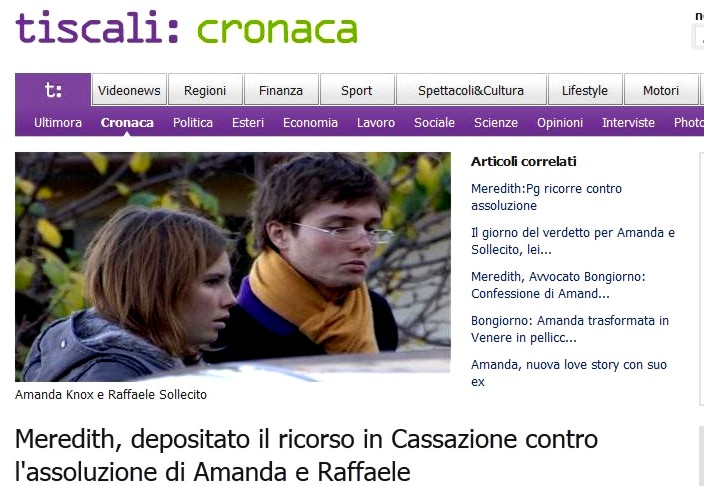
My translation. Please click above for the original.
Meredith: the appeal in Cassation Court has been lodged against the acquittal of Amanda and Raffaele
The appeal agains the acquittal of Raffaele Sollecito and Amanda Knox for the murder of Meredith Kercher was lodged this morning by the Prosecutor General. The appeal is contained in 111 pages, signed by the Prosecutor General Giovanni Galati and by the deputy [prosecutor], Giancarlo Costagliola.
In a meeting with journalists, Mr Galati and Mr Costagliola themselves explained that the appeal originates from their firm conviction that Sollecito and Knox are “co-perpetrators” in the murder of Meredith Kercher. Referring to the appeal verdict, Galati and Costagliola spoke of a verdict “needing to be revoked” which has “omissions and a great many errors”.
In their appeal the magistrates therefore call for the reversal of the second-level (Hellman) verdict and thus for a new appeal trial for the two young folk.
Inconsistency of the Reasoning Report Mr Galati described as “unfortunate” the opening words of the associate judge, Massimo Zanetti, who began the introduction of the report with the claim that “the only certainty” was the death of Meredith Kercher.
“A resounding forecast of the judgement”, the chief prosecutor claimed, “before even having heard the accounts of the prosecution and of the defence”. For Mr Galati, the appeal verdict “seems to be a second first-instance verdict, but in which the judges read the arguments of the defence beforehand [i.e. before hearing the prosecution’s case]”.
He then spoke of “inconsistency” in the reasoning report, of a “useless reasoning which achieves nothing”. In contrast, the Reasoning Report of the first-instance [Massei] trial was, to his mind, “complete and thorough, based on [elements of] evidence that were compatible with each other”.
Levelling to the defences’ stance “I immediately had the feeling that the appeal verdict was profoundly unjust” Costagliola then added, “and I am now convinced that it should be revoked. It is as if the judges had made an ex novo decision - tilting everything to the direction of the defence.”
Rudy Guede [who was definitively sentenced to 16 years through the fast-track trial system - editor’s note] was [in effect] put on trial again, even though he was not a defendant in these proceedings.
It leads one to think that, because the Court held that Guede was guilty of the break-in [of the window of the room belonging to one of the flatmates in via della Pergola - editor’s note], Sollecito and Knox should [therefore] be acquitted of the charge of executing a crime.”
Sollecito: “A 4-year Calvary” In the meantime, Raffaele Sollecito also remarked on the news, and spoke of “hounding against him”. “It is a never-ending story. For me, it is a real Calvary [nightmare] which has lasted 4 years”, he said, after having learned of the appeal lodged against his acquittal and that of Amanda Knox.
He was told the news by one of his defence attorneys, the lawyer Luca Maori. “I agree with him”, the lawyer said, “and to me it seems almost that the prosecutors are hounding him.”
First Post Reports That Meredith’s Family Have Joined In The Supreme Court Appeal
Posted by Peter Quennell

Click image above for a long and impressively fast report by Andrea Vogt about the Supreme Court appeal: and Meredith’s family being a party to it.
Andrea Vogt also notes the huge mismatch between the Hellman outcome and its terms of reference which Attorney General Galati targeted in his remarks today (see post below) and which the Supreme Court, based on past performance. may not take kindly to..
First the Court of Cassation must decide whether to consider the case or not. Once under consideration, if the court agrees with prosecutors, a new appeals trial is triggered. If they disagree, the current acquittal stands.
“They [the petitioning lawyers] will seek nullification of the second instance decision on points of law,” explained Stefano Maffei, an expert on Italian criminal law. “If they are successful, the case will then return to the Court of Appeals for a further assessment of the merit of the case.”
And on the problematic Amanda Knox book:
While US media this week described Knox as having bowled over editors with her “smart, self-assured and intelligent” manner, some in Italy have been less than impressed, instead criticising her for everything from her appearance since returning home to her latest attempts to profit from Meredith Kercher’s murder.
The real question is, how much exactly will Knox reveal? Will she publish all the letters she received in prison… including those fawning pleas for first interviews? Will she describe the jealousies of fellow prisoners, which she finally overcame working for the prison dispensary?
How much will she disclose about Rocco Girlanda, the Umbrian parliamentarian who used his parliamentary right to enter the Capanne prison at any time to regularly visit her and bring her gifts? Girlanda eventually capitalised on those visits to write his own book in Italian - a cloying account of those visits in which Knox’s letters to him were reprinted after being censored and redacted.
We will be drawing attention in a later post to several hundred additional questions.

